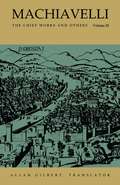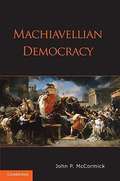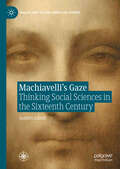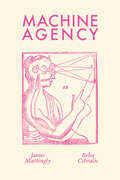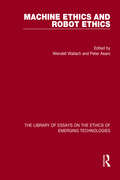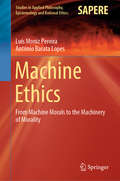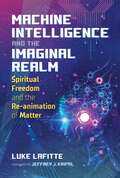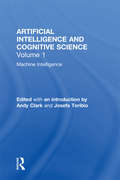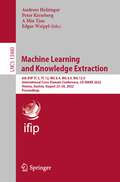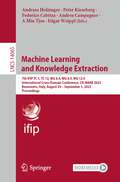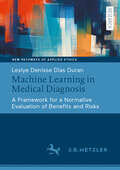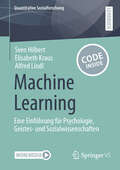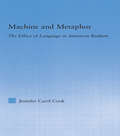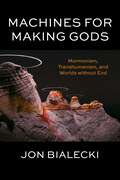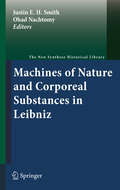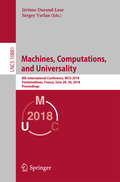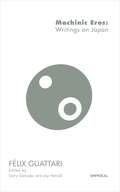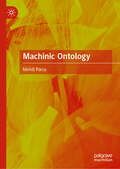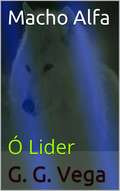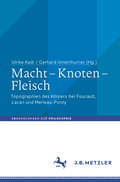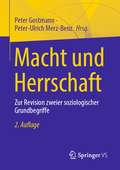- Table View
- List View
Machiavelli: The Chief Works and Others, Volume III
by Allan Gilbert Nicollò di Bernado dei MachiavelliIncludes: <P><P> * The History of Florence<P> * The Natures of Florentine Men<P> * The Decennale<P> * and more<P> From praise for the 1965 edition: Allan Gilbert is unquestionably the most accurate and reliable translator of Machiavelli into English; the publication of this edition is an altogether happy occasion. Students of the history of political thought owe a particular debt of gratitude to Allan Gilbert. "--Dante Germino, The Journal of Politics "A most remarkable achievement. "--Felix Gilbert, Renaissance Quarterly
Machiavellian Democracy
by John P. MccormickIntensifying economic and political inequality poses a dangerous threat to the liberty of democratic citizens. Mounting evidence suggests that economic power, not popular will, determines public policy, and that elections consistently fail to keep public officials accountable to the people. John P. McCormick confronts this dire situation through a dramatic reinterpretation of Niccol- Machiavelli's political thought. Highlighting previously neglected democratic strains in Machiavelli's major writings, McCormick excavates institutions through which the common people of ancient, medieval, and Renaissance republics constrained the power of wealthy citizens and public magistrates, and he imagines how such institutions might be revived today. Machiavellian Democracy fundamentally reassesses one of the central figures in the Western political canon and decisively intervenes into current debates over institutional design and democratic reform. Inspired by Machiavelli's thoughts on economic class, political accountability and popular empowerment, McCormick proposes a citizen body that excludes socioeconomic and political elites and grants randomly selected common people significant veto, legislative, and censure authority within government and over public officials.
Machiavelli’s Gaze: Thinking Social Sciences in the Sixteenth Century (Italian and Italian American Studies)
by Sandro LandiThis book examines Machiavelli in contemporary or past realities through the way in which he read, wrote, related to cultures distant in time and space—a first in the field of Machiavellian studies. It proposes and experiments with a change of perspective: in essence, it is not interested in what Machiavelli probably was, but in what Machiavelli did. In this perspective, Machiavelli remains a paradoxically still little-explored historical case. Issues and methods developed in recent decades by intellectual history, the history of reading, and cultural anthropology have remained substantially unfamiliar to Machiavelli scholars. This is a book that renews the vision of Machiavelli: no longer the starting or finishing point of intellectual genealogies that are often openly ideological, but an extraordinary case study that allows us to analyse the birth, in the sixteenth century, of a composite knowledge specifically dedicated to man in society.
Machine Agency
by James Mattingly Beba CibralicAn engaging exploration of agency that provides students with the critical tools needed to understand and participate in debates about future machines.The great promise of artificial intelligence’s evolution lives alongside an equally great anxiety. As we develop increasingly autonomous machines that do things in the world, questions about agency—distinguishing machines that can act from those that cannot—are among the thorniest we face. A concise and probing exploration of agency, this accessible textbook provides the critical, technical, and conceptual tools needed to make sense of rapid changes in what machines can do and their role in our lives. James Mattingly and Beba Cibralic begin with an examination of foundational issues: What is agency? How does it differ from mindedness, consciousness, and intelligence? Can we attribute agency to certain machines, and if so, how and why? They then examine the social and ethical implications of building ever more complex machines, including those concerning moral status and responsibility. Drawing together ideas from philosophy and computer science as well as from information theory, literature, and the history of science, Machine Agency invites students to participate thoughtfully in critical debates about future machines.• Provides a roadmap for interrogating the concept of machine agency suitable for philosophy majors and non-majors alike• Investigates the connections between developments in AI and pressing issues in analytic philosophy• Explores the social and ethical impacts of computational systems with agency Features robust end-of-chapter exercises
Machine Ethics and Robot Ethics
by Wendell Wallach and Peter AsaroOnce the stuff of science fiction, recent progress in artificial intelligence, robotics, and machine learning means that these rapidly advancing technologies are finally coming into widespread use within everyday life. Such rapid development in these areas also brings with it a host of social, political and legal issues, as well as a rise in public concern and academic interest in the ethical challenges these new technologies pose. This volume is a collection of scholarly work from leading figures in the development of both robot ethics and machine ethics; it includes essays of historical significance which have become foundational for research in these two new areas of study, as well as important recent articles. The research articles selected focus on the control and governance of computational systems; the exploration of ethical and moral theories using software and robots as laboratories or simulations; inquiry into the necessary requirements for moral agency and the basis and boundaries of rights; and questions of how best to design systems that are both useful and morally sound. Collectively the articles ask what the practical ethical and legal issues, arising from the development of robots, will be over the next twenty years and how best to address these future considerations.
Machine Ethics: From Machine Morals to the Machinery of Morality (Studies in Applied Philosophy, Epistemology and Rational Ethics #53)
by Luís Moniz Pereira António Barata LopesThis book offers the first systematic guide to machine ethics, bridging between computer science, social sciences and philosophy. Based on a dialogue between an AI scientist and a novelist philosopher, the book discusses important findings on which moral values machines can be taught and how. In turn, it investigates what kind of artificial intelligence (AI) people do actually want. What are the main consequences of the integration of AI in people’s every-day life? In order to co-exist and collaborate with humans, machines need morality, but which moral values should we teach them? Moreover, how can we implement benevolent AI? These are just some of the questions carefully examined in the book, which offers a comprehensive account of ethical issues concerning AI, on the one hand, and a timely snapshot of the power and potential benefits of this technology on the other. Starting with an introduction to common-sense ethical principles, the book then guides the reader, helping them develop and understand more complex ethical concerns and placing them in a larger, technological context. The book makes these topics accessible to a non-expert audience, while also offering alternative reading pathways to inspire more specialized readers.
Machine Intelligence and the Imaginal Realm: Spiritual Freedom and the Re-animation of Matter
by Luke Lafitte• Explores how we naturally project consciousness onto machines and how this is reflected in human culture, science, artificial intelligence, and literature • Demonstrates a direct connection between consciousness and the history of machines in American history • Looks at the contributions and influence of Grace Hopper, Richard Feynman, Philip K. Dick, Nikola Tesla, Thomas Edison, Elon Musk, David Bohm, Norbert Wiener, and Steve Jobs as well as the Nag Hammadi Gnostic gospels Humans invented and constructed machines to aid them, as far back as the Stone Age. As the machines became more complex, they became extensions of the body and mind, and we naturally began projecting consciousness onto them. As Luke Lafitte shows in detail, although machines complicate the already complicated issue of identity, because they are &“ours&” and &“of us,&” they are part of our spiritual development. In this sweeping exploration of the history of the machine as a tool, as a transpersonal object to assist human activity, and as a transitional artifact between spirits and the humans who interact with them, Lafitte examines the role that machines play in the struggle between &“spiritual man&” and &“mechanical man&” throughout history. He interprets the messages, archetypes, and language of the unconscious in the first popular stories related to mechanical men, and he demonstrates a direct connection between consciousness and the history of machines in American history, specifically between the inventors of these machines and the awakening of our imaginations and our powers of manifestation. He examines the influence of Philip K. Dick, Nikola Tesla, Thomas Edison, Grace Hopper, Richard Feynman, Elon Musk, David Bohm, and others and shows how the Nag Hammadi gospels explain how we can take back our myth and spirit from the machine. Although the term &“mechanical man&” is a catch-all phrase, Lafitte shows that the term is also a meeting ground where extra-dimensional communications between different forms of matter occur. Every machine, android, robot, and cyborg arose from consciousness, and these mechanical men, whether real or fictive, offer us an opportunity to free ourselves from enslavement to materialism and awaken our imaginations to create our own realities.
Machine Intelligence: Perspectives on the Computational Model (Artificial Intelligence And Cognitive Science Ser.)
by Andy Clark Josefa ToribioSummarizes and illuminates two decades of researchGathering important papers by both philosophers and scientists, this collection illuminates the central themes that have arisen during the last two decades of work on the conceptual foundations of artificial intelligence and cognitive science. Each volume begins with a comprehensive introduction that places the coverage in a broader perspective and links it with material in the companion volumes. The collection is of interest in many disciplines including computer science, linguistics, biology, information science, psychology, neuroscience, iconography, and philosophy. Examines initial efforts and the latest controversiesThe topics covered range from the bedrock assumptions of the computational approach to understanding the mind, to the more recent debates concerning cognitive architectures, all the way to the latest developments in robotics, artificial life, and dynamical systems theory. The collection first examines the lineage of major research programs, beginning with the basic idea of machine intelligence itself, then focuses on specific aspects of thought and intelligence, highlighting the much-discussed issue of consciousness, the equally important, but less densely researched issue of emotional response, and the more traditionally philosophical topic of language and meaning. Provides a gamut of perspectives The editors have included several articles that challenge crucial elements of the familiar research program of cognitive science, as well as important writings whose previous circulation has been limited. Within each volume the papers are organized to reflect a variety of research programs and issues. The substantive introductions that accompany each volume further organize the material and provide readers with a working sense of the issues and the connection between articles.
Machine Learning and Knowledge Extraction: 6th IFIP TC 5, TC 12, WG 8.4, WG 8.9, WG 12.9 International Cross-Domain Conference, CD-MAKE 2022, Vienna, Austria, August 23–26, 2022, Proceedings (Lecture Notes in Computer Science #13480)
by Andreas Holzinger Edgar Weippl A Min Tjoa Peter KiesebergThis book constitutes the refereed proceedings of the 6th IFIP TC 5, TC 12, WG 8.4, WG 8.9, WG 12.9 International Cross-Domain Conference, CD-MAKE 2022, held in Vienna, Austria during August 2022.The 23 full papers presented were carefully reviewed and selected from 45 submissions. The papers are covering a wide range from integrative machine learning approach, considering the importance of data science and visualization for the algorithmic pipeline with a strong emphasis on privacy, data protection, safety and security.
Machine Learning and Knowledge Extraction: 7th IFIP TC 5, TC 12, WG 8.4, WG 8.9, WG 12.9 International Cross-Domain Conference, CD-MAKE 2023, Benevento, Italy, August 29 – September 1, 2023, Proceedings (Lecture Notes in Computer Science #14065)
by Andreas Holzinger Edgar Weippl A Min Tjoa Peter Kieseberg Federico Cabitza Andrea CampagnerThis volume LNCS-IFIP constitutes the refereed proceedings of the 7th IFIP TC 5, TC 12, WG 8.4, WG 8.9, WG 12.9 International Cross-Domain Conference, CD-MAKE 2023 in Benevento, Italy, during August 28 – September 1, 2023. The 18 full papers presented together were carefully reviewed and selected from 30 submissions. The conference focuses on integrative machine learning approach, considering the importance of data science and visualization for the algorithmic pipeline with a strong emphasis on privacy, data protection, safety and security.
Machine Learning in Medical Diagnosis: A Framework for a Normative Evaluation of Benefits and Risks (Neue Wege der Angewandten Ethik / New Pathways of Applied Ethics)
by Leslye Denisse Dias DuranThis book seeks to navigate between the optimism that has arisen from the promise of the potential of machine learning (ML) in healthcare, and the lack of clarity about what realistic risks and benefits we can foresee. Its main aim is to develop a relational, rights-based normative approach to evaluating the distribution of burdens and benefits of implementing ML in medical diagnosis. This framework, called the "Ecosystem of Moral Constellations", assumes that every person has an equal claim to the fundamental rights necessary to lead one&’s life, but recognizes that there may be conflicting interests that risk violating or infringing the rights of an individual or individuals, and that therefore an assessment of these tensions requires a situational prioritization of certain rights over others. This framework proposes to consider the normative relevance of relationships at different points of moral engagement to assess the potential tensions between these burdens and benefits of these technologies. The author argues that decisions about the implementation of AI systems require more than an assessment of technical feasibility. Instead, it is imperative to consider the different normative goals and interests of the actors involved, the material capabilities of the tools, and the role they should play in the clinical workflow.
Machine Learning: Eine Einführung für Psychologie, Geistes- und Sozialwissenschaften (Quantitative Sozialforschung)
by Alfred Lindl Sven Hilbert Elisabeth KrausDieses Buch richtet sich an alle, welche die enormen Potenziale maschinellen Lernens für wissenschaftliche Fragestellungen und innovative Ansätze in Studium oder Beruf nutzen möchten. Denn maschinelles Lernen eröffnet neue Möglichkeiten zum effizienten Umgang mit umfassenden, komplex strukturierten und sich schnell entwickelnden Daten. Zunächst werden Grundideen und typische Anwendungsfelder maschinellen Lernens sowie dessen Vorzüge gegenüber inferenzstatistischen Verfahren erläutert. Daran schließen praktische Hinweise dazu an, wie Daten für maschinelle Lernprozesse aufbereitet werden und wie diese durch Anpassung verschiedener Parameter möglichst optimale Ergebnisse erzielen können. Von den hierzu einsetzbaren Modellen werden die gängigsten theoretisch und anhand anschaulicher Beispiele vorgestellt. Auch auf verschiedene Optionen zur besseren Interpretierbarkeit sowie auf spezifische Limitationen von Analyseresultaten wird eingegangen. Weiterführende Anwendungsfälle und verständlich kommentierte Analysecodes sind auf dem GitHub-Repositorium zu diesem Buch auf SpringerLink online verfügbar.
Machine and Metaphor: The Ethics of Language in American Realism (Literary Criticism and Cultural Theory)
by Jennifer C. CookAmerican literary realism burgeoned during a period of tremendous technological innovation. Because the realists evinced not only a fascination with this new technology but also an ethos that seems to align itself with science, many have paired the two fields rather unproblematically. But this book demonstrates that many realist writers, from Mark Twain to Stephen Crane, Charles W. Chesnutt to Edith Wharton, felt a great deal of anxiety about the advent of new technologies – precisely at the crucial intersection of ethics and language. For these writers, the communication revolution was a troubling phenomenon, not only because of the ways in which the new machines had changed and increased the circulation of language but, more pointedly, because of the ways in which language itself had effectively become a machine: a vehicle perpetuating some of society’s most pernicious clichés and stereotypes – particularly stereotypes of race – in unthinking iteration. This work takes a close look at how the realists tried to forge an ethical position between the two poles of science and sentimentality, attempting to create an alternative mode of speech that, avoiding the trap of codifying iteration, could enable ethical action.
Machine and Sovereignty: For a Planetary Thinking
by Yuk HuiDeveloping a new political thought to address today&’s planetary crises What is &“planetary thinking&” today? Arguing that a new approach is urgently needed, Yuk Hui develops a future-oriented mode of political thought that encompasses the unprecedented global challenges we are confronting: the rise of artificial intelligence, the ecological crisis, and intensifying geopolitical conflicts. Machine and Sovereignty starts with three premises. The first affirms the necessity of developing a new language of coexistence that surpasses the limits of nation-states and their variations; the second recognizes that political forms, including the polis, empire, and the state, are technological phenomena, which Lewis Mumford terms &“megamachines.&” The third suggests that a particular political form is legitimated and rationalized by a corresponding political epistemology. The planetary thinking that this book sketches departs from the opposition between mechanism and organism, which characterized modern thought, to understand the epistemological foundations of Hegel&’s political state and Schmitt&’s Großraum and their particular ways of conceiving the question of sovereignty. Through this reconstruction, Hui exposes the limits of the state and reflects on a new theoretical matrix based on the interrelated concepts of biodiversity, noodiversity, and technodiversity. Arguing that we are facing the limit of modernity, of the eschatological view of history, of globalization, and of the human, Hui conceives necessary new epistemological and technological frameworks for understanding and rising to the crises of our present and our future. Retail e-book files for this title are screen-reader friendly.
Machines for Making Gods: Mormonism, Transhumanism, and Worlds without End
by Jon BialeckiThe Mormon faith may seem so different from aspirations to transcend the human through technological means that it is hard to imagine how these two concerns could even exist alongside one another, let alone serve together as the joint impetus for a social movement. Machines for Making Gods investigates the tensions between science and religion through which an imaginative group of young Mormons and ex-Mormons have found new ways of understanding the world.The Mormon Transhumanist Association (MTA) believes that God intended humanity to achieve Mormonism’s promise of theosis through imminent technological advances. Drawing on a nineteenth-century Mormon tradition of religious speculation to reimagine Mormon eschatological hopes as near-future technological possibilities, they envision such current and possible advances as cryonic preservation, computer simulation, and quantum archeology as paving the way for the resurrection of the dead, the creation of worlds without end, and promise of undergoing theosis—of becoming a god. Addressing the role of speculation in the anthropology of religion, Machines for Making Gods undoes debates about secular transhumanism’s relation to religion by highlighting the differences an explicitly religious transhumanism makes.Charting the conflicts and resonances between secular transhumanism and Mormonism, Bialecki shows how religious speculation has opened up imaginative horizons to give birth to new forms of Mormonism, including a particular progressive branch of the faith and even such formations as queer polygamy. The book also reveals how the MTA’s speculative account of God and technology together has helped to forestall some of the social pressure that comes with apostasy in much of the Mormon Intermountain West.A fascinating ethnography of a group with much to say about crucial junctures of modern culture, Machines for Making Gods illustrates how the scientific imagination can be better understood when viewed through anthropological accounts of myth.
Machines of Nature and Corporeal Substances in Leibniz
by Justin E. Smith Ohad NachtomyIn recent decades, there has been much scholarly controversy as to the basic ontological commitments of the philosopher Gottfried Wilhelm Leibniz (1646-1716). The old picture of his thought as strictly idealistic, or committed to the ultimate reduction of bodies to the activity of mind, has come under attack, but Leibniz's precise conceptualization of bodies, and the role they play in his system as a whole, is still the subject of much controversy. One thing that has become clear is that in order to understand the nature of body in Leibniz, and the role body plays in his philosophy, it is crucial to pay attention to the related concepts of organism and of corporeal substance, the former being Leibniz's account of the structure of living bodies (which turn out, for him, to be the only sort of bodies there are), and the latter being an inheritance from the Aristotelian hylomorphic tradition which Leibniz appropriates for his own ends. This volume brings together papers from many of the leading scholars of Leibniz's thought, all of which deal with the cluster of questions surrounding Leibniz's philosophy of body.
Machines of the Mind: Personification in Medieval Literature
by Katharine BreenIn Machines of the Mind, Katharine Breen proposes that medieval personifications should be understood neither as failed novelistic characters nor as instruments of heavy-handed didacticism. She argues that personifications are instead powerful tools for thought that help us to remember and manipulate complex ideas, testing them against existing moral and political paradigms. Specifically, different types of medieval personification should be seen as corresponding to positions in the rich and nuanced medieval debate over universals. Breen identifies three different types of personification—Platonic, Aristotelian, and Prudentian—that gave medieval writers a surprisingly varied spectrum with which to paint their characters. Through a series of new readings of major authors and works, from Plato to Piers Plowman, Breen illuminates how medieval personifications embody the full range of positions between philosophical realism and nominalism, varying according to the convictions of individual authors and the purposes of individual works. Recalling Gregory the Great’s reference to machinae mentis (machines of the mind), Breen demonstrates that medieval writers applied personification with utility and subtlety, employing methods of personification as tools that serve different functions. Machines of the Mind offers insight for medievalists working at the crossroads of religion, philosophy, and literature, as well as for scholars interested in literary character-building and gendered relationships among characters, readers, and texts beyond the Middle Ages.
Machines of the Mind: Personification in Medieval Literature
by Katharine BreenIn Machines of the Mind, Katharine Breen proposes that medieval personifications should be understood neither as failed novelistic characters nor as instruments of heavy-handed didacticism. She argues that personifications are instead powerful tools for thought that help us to remember and manipulate complex ideas, testing them against existing moral and political paradigms. Specifically, different types of medieval personification should be seen as corresponding to positions in the rich and nuanced medieval debate over universals. Breen identifies three different types of personification—Platonic, Aristotelian, and Prudentian—that gave medieval writers a surprisingly varied spectrum with which to paint their characters. Through a series of new readings of major authors and works, from Plato to Piers Plowman, Breen illuminates how medieval personifications embody the full range of positions between philosophical realism and nominalism, varying according to the convictions of individual authors and the purposes of individual works. Recalling Gregory the Great’s reference to machinae mentis (machines of the mind), Breen demonstrates that medieval writers applied personification with utility and subtlety, employing methods of personification as tools that serve different functions. Machines of the Mind offers insight for medievalists working at the crossroads of religion, philosophy, and literature, as well as for scholars interested in literary character-building and gendered relationships among characters, readers, and texts beyond the Middle Ages.
Machines of the Mind: Personification in Medieval Literature
by Katharine BreenIn Machines of the Mind, Katharine Breen proposes that medieval personifications should be understood neither as failed novelistic characters nor as instruments of heavy-handed didacticism. She argues that personifications are instead powerful tools for thought that help us to remember and manipulate complex ideas, testing them against existing moral and political paradigms. Specifically, different types of medieval personification should be seen as corresponding to positions in the rich and nuanced medieval debate over universals. Breen identifies three different types of personification—Platonic, Aristotelian, and Prudentian—that gave medieval writers a surprisingly varied spectrum with which to paint their characters. Through a series of new readings of major authors and works, from Plato to Piers Plowman, Breen illuminates how medieval personifications embody the full range of positions between philosophical realism and nominalism, varying according to the convictions of individual authors and the purposes of individual works. Recalling Gregory the Great’s reference to machinae mentis (machines of the mind), Breen demonstrates that medieval writers applied personification with utility and subtlety, employing methods of personification as tools that serve different functions. Machines of the Mind offers insight for medievalists working at the crossroads of religion, philosophy, and literature, as well as for scholars interested in literary character-building and gendered relationships among characters, readers, and texts beyond the Middle Ages.
Machines, Computations, and Universality: 8th International Conference, MCU 2018, Fontainebleau, France, June 28–30, 2018, Proceedings (Lecture Notes in Computer Science #10881)
by Jérôme Durand-Lose Sergey VerlanThis book constitutes the refereed proceedings of the 8th International Conference on Machines, Computations, and Universality, MCU 2018, held in Fontainebleau, France, in June 2018. The 9 revised full papers presented together with 5 invited talks were carefully reviewed and selected from numerous submissions. MCU explores computation in the setting of various discrete models (Turing machines, register machines, cellular automata, tile assembly systems, rewriting systems, molecular computing models, neural models, concurrent systems, etc.) and analog and hybrid models (BSS machines, infinite time cellular automata, real machines, quantum computing, etc.).
Machinic Eros: Writings on Japan (Univocal)
by Félix GuattariThe French philosopher Félix Guattari frequently visited Japan during the 1980s and organized exchanges between French and Japanese artists and intellectuals. His immersion into the &“machinic eros&” of Japanese culture put him into contact with media theorists such as Tetsuo Kogawa and activists within the mini-FM community (Radio Home Run), documentary filmmakers (Mitsuo Sato), photographers (Keiichi Tahara), novelists (Kobo Abe), internationally recognized architects (Shin Takamatsu), and dancers (Min Tanaka). From pachinko parlors to high-rise highways, alongside corporate suits and among alt-culture comrades, Guattari put himself into the thick of Japanese becomings during a period in which the bubble economy continued to mutate. This collection of essays, interviews, and longer meditations shows a radical thinker exploring the architectural environment of Japan&’s &“machinic eros.&”
Machinic Ontology
by Mehdi ParsaThis book considers the becoming-concept of the machine-metaphor. It explores the intersections between this becoming and the development of the concepts of life, organism, and technics. It seeks to introduce universal machinism as a metaphysical foundation with specific ethical and political implications. A machinic ontology proposes that the whole has no inside, the body has no head, a society needs no leader, and the brain has no center. While undoubtedly a Deleuzoguattarian idea, this book endeavors to explore its origins and echoes across various thinkers and domains. In this context, it examines and analyzes the concepts of monstrous machine, transindividual machine, plastic machine, abstract machine and biopolitical machine as they appear in the works of George Canguilhem, Gilbert Simondon, Catherine Malabou, Gilles Deleuze and Félix Guattari, Michel Foucault, and Giorgio Agamben. Machinic Ontology is essential reading for all scholars and researchers in metaphysics especially those interested in the nature of living and non-living entities and natural systems.
Macho Alfa
by Guido Galeano Vega Eunice T AndreLivro que trata de aspectos sociais e culturais de líderes em grupos animais e humanos. Macho Alfa Este conceito é mais bem aplicado no âmbito da natureza ou no sistema biológico animal. Nas sociedades modernas, é aplicado também para definir certo tipo de pessoas, que se caracterizam por sua capacidade de liderança. Como o conceito tem uma relação mais direta com o mundo animal, e mais ainda vinculado a certas espécies de predadores, implacáveis, de extrema eficiência no processo de caçada grupal, atividade motivada para garantir ou melhorar a possibilidade de sobrevivência em contextos de natureza selvagem, como é o caso dos lobos. Ele tem sido aplicado também nos grupos humanos com um estilo de vida de características similares.
Macht - Knoten - Fleisch: Topographien des Körpers bei Foucault, Lacan und Merleau-Ponty (Abhandlungen zur Philosophie)
by Ulrike Kadi Gerhard UnterthurnerDer "Macht - Knoten - Fleisch. Topographien des Körpers bei Foucault, Lacan und Merleau Ponty" greift eine Reihe von Begriffen und Konzepten der drei Referenzautoren heraus, die für ein zeitgemäßes Verständnis des Körpers entscheidend sind. Bei Foucault wird der Körper von seiner Verflechtung mit Macht und Wissen her thematisiert. Die Knoten, die Körper machen und Körper-Raum-Verhältnisse vorstellen, sind für Lacan relevant. Und Merleau-Ponty bietet mit Stichworten wie der leiblichen Praxis, der Zwischenleiblichkeit oder des „Fleisches des Welt“ weitere theoretische Facetten, die es zu berücksichtigen gilt. Der Band versteht sich nicht nur als ein Beitrag zu einem Dialog über den Körper zwischen Genealogie, Psychoanalyse und Phänomenologie. Sondern der Band ist als Brückenkopf für einen Wissenstransfer zu anderen Körperwissenschaften konzipiert. Er richtet sich daher an Lehrende, Forschende und Lernende aus Disziplinen, die sich mit dem Körper beschäftigen. Gleichermaßen soll er interessierten Laien ein Werkzeug zur Einordnung und Bearbeitung von neuen Phänomenen in, an und mit dem Körper an die Hand geben.
Macht und Herrschaft: Zur Revision zweier soziologischer Grundbegriffe
by Peter Gostmann Peter-Ulrich Merz-BenzDas Buch befasst sich mit Kernbegriffen der Sozialwissenschaften: Macht und Herrschaft. Mit Beiträgen von Gerhard Wagner, Guy Oakes, Hubert Treiber, Peter Gostmann, Peter-Ulrich Merz-Benz, Dirk Tänzler und Stephen Turner.
